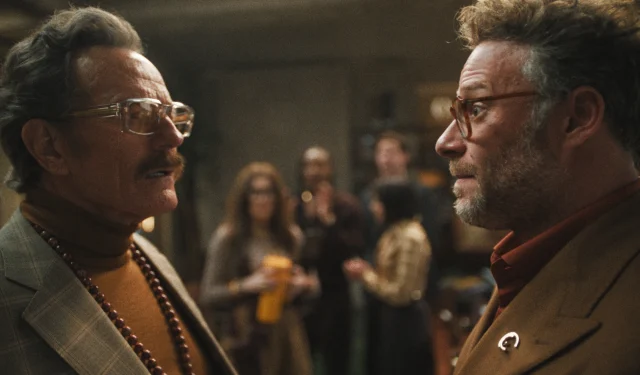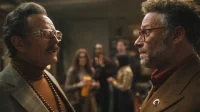[This article contains spoilers for the first two episodes of The Studio on Apple TV+.]
The concept of a film studio contemplating a movie centered around Kool-Aid—a sugary beverage with a smiling pitcher as its mascot—seems highly believable within the current landscape of the entertainment industry, which is fixated on intellectual properties (IPs). This absurd yet captivating premise serves as the catalyst for Apple TV+’s satirical narrative, The Studio.
At the center of this narrative is the character Matt, portrayed by Seth Rogen, who insists he is a dedicated cinephile eager to create impactful films. However, he only ascends to his prominent position after convincing his CEO, played by Bryan Cranston, that he will take on the Kool-Aid project. While The Studio does not explicitly claim that Matt has been promoted through failure—he has worked on what became Continental’s most lucrative franchise—it does suggest he finds himself entrenched in an unwinnable scenario. “I got into this business because I love movies,”he confides to Patty, expressing his trepidation that his role may ultimately lead to their demise.
Here are some key insights from the first two episodes of The Studio:
Star-Studded Cameos Galore
The series kicks off with the production of a Continental film, showcasing Paul Dano engaged in a gripping fight sequence while acclaimed director Peter Berg observes. This is merely the first glimpse of a multitude of cameos that enrich the series, preceding Rogen’s introduction as Matt. Director Nicholas Stoller makes an appearance as the enthusiastic Kool-Aid director—his pitch is both outrageous and believable, echoing his collaborative history with Rogen on projects like Platonic and the Neighbors films.
A pivotal moment occurs when Martin Scorsese approaches Matt with the idea of a film centered around the Jonestown tragedy. Matt, exhilarated at the thought of greenlighting a project directed by Scorsese, impulsively commits to it, only to be quickly disabused of his excitement by his marketing head, played by an energetic Kathryn Hahn. The emotional aftermath unfolds at a party where Charlize Theron and Steve Buscemi appear, leading to an awkward interaction in which Matt has to inform Scorsese that the Jonestown film will not proceed—prompting a poignant mix of humor and heartache.
Homage to Hollywood’s Icons
Griffin Mill, the character played by Bryan Cranston, cleverly references the iconic 1992 film The Player. His characterization diverges significantly from Tim Robbins’ portrayal but adds a layer of nostalgia and intrigue. Moreover, the contrast between Griffin’s flamboyant persona, reminiscent of real-life producer Robert Evans, and the more traditional Hollywood executives injects both humor and commentary into the narrative.
The DNA of Veep
Co-creators Gregory and Huyck, former writers and producers for the acclaimed HBO series Veep, imbue The Studio with a similar biting humor. The show deftly explores how the absurd motivations that pervade the entertainment sector can distort even the most idealistic figures. While the episodes do not yet employ the same degree of profanity famous in Veep, the sharp dialogue remains compelling. Patty’s quip to Sal Saperstein, “You’re not as dumb as you look, which is not saying much,” resonates with the show’s comedic style, reminiscent of the quick-witted exchanges in previous works by the creators.
A visual signature: Tracking Shots
In the second episode aptly titled “The Oner,” the narrative revolves around Polley’s ambition to capture an intricate, long take that constitutes the climax of her film—crafted in what appears to be a continuous 25-minute sequence. This technique is not exclusive to this episode; both preceding and forthcoming episodes also feature extended tracking shots, establishing a distinctive visual motif for the series. This stylistic choice nods to The Player, which famously opens with a mesmerizing eight-minute tracking shot, merging homage with innovative storytelling.
Marveling at Scorsese’s Comic Timing
While it may not come as a surprise, Martin Scorsese exhibits impressive comedic skill in this series, weaving humor into scenes reminiscent of classic sitcoms. In a particularly memorable interaction, as Matt and Sal navigate the precarious task of conveying to Scorsese that his Jonestown project is off the table, the director’s astute observations about their furtive expressions shine through. The dialogue showcases not only Scorsese’s timing but also the clever writing that keeps the audience engaged, culminating in a poignant request to reclaim his script while simultaneously dropping a hint about seeking a better deal with Apple.
The first two episodes of The Studio effectively set the stage for an insightful and humorous exploration of the film industry’s absurdities. With its star-studded cast, clever writing, and innovative cinematography, the series promises a captivating viewing experience.


